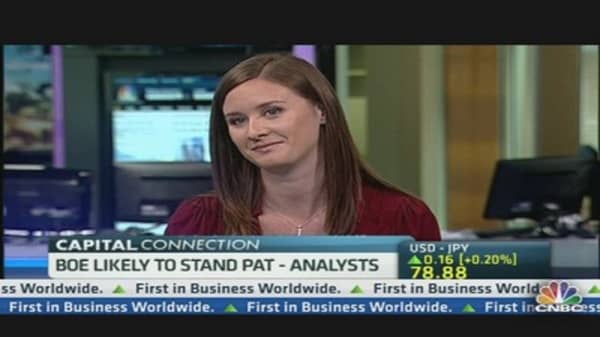The outlook for the U.K.’s economy has steadily worsened, giving the members of the Bank of England’s Monetary Policy Committee (MPC) plenty to chew on when they meet Wednesday and Thursday.
The MPC is expected by most economists to keep interest rates at their current historic low of 0.5 percent following the meeting. Quantitative easing will be on the agenda — although most of the committee members are predicted to vote against increasing the 325 billion pounds ($499 billion) already injected into the U.K.’s banking system. No less an authority than the International Monetary Fund urged the bank to consider expanding it last month.
The decision will be a “close call” according to Simon Wells, chief economist at HSBC. Adam Posen is thought to be likely to join David Miles in calling for more easing.
Previous rounds of quantitative easing so far seem to be failing to trickle down into the real economy.
This week’s meeting comes at a point when worries about the U.K. economy are increasing and data increasingly points to a worse recession than the mild downturn previously forecast. On Friday, manufacturing PMI data — a key forward-looking indicator for the economy — posted its second-largest fall on record. Gross domestic product for the first three months of the year was revised down to a drop of 0.3 percent, worse than the bank had expected.
House prices, retail sales, manufacturing output, and the FTSE 100are all falling. The continuing strength of sterling against the euro could become an issue for manufacturing in the U.K. soon, as analysts at Sarasin point out.
Inflation , down to 3 percent, is one of few bright spots.
Investors are mainly preoccupied with preserving capital, buying up bonds and gilts, rather than using cheaper money to reinvest in companies that would promote growth in the U.K. For U.K. bonds, 10-year yields are at an historic low of around 1.5 percent, and gilt yields below 0.5 percent up to four years.
Further lowering of interest rates, which most people already think will stay at their current historic lows for another year, could also be ineffectual.
The ongoing problems in Greece, which could mean that the U.K. economy has further to fall — in which case the bank may want to keep further quantitative easing as a measure in its back pocket — will affect the agenda.
Wells believes that the bank will put off more easing until after its August forecasts.
Vicky Redwood, chief U.K. economist at Capital Economics, warned that the bank isn’t factoring in the worst-case scenarios for the euro zone.
“We think that the MPC will probably venture beyond gilt purchases at some point. But for now, it is likely to stick with buying government bonds,” she wrote in a research note. “If the MPC does do more then, in the first instance, it is likely to be another 50 billion of gilt purchases.”
Spencer Dale, the bank's chief economist and another member of the MPC, told CNBC last week that he thought there would be a recovery in the UK by the end of the year.
—By CNBC’s Catherine Boyle
Twitter: @catboyle01





